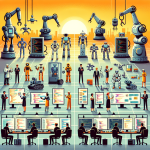Mechanical engineering is a dynamic and versatile field that plays a pivotal role in the development of a wide array of technologies and systems that define modern life. From designing everyday consumer products to creating sophisticated machinery used in industries, mechanical engineers are at the forefront of innovation, problem-solving, and advancements in technology. This article explores the significance of mechanical engineering and its potential for career advancement.
Understanding Mechanical Engineering
Mechanical engineering is one of the broadest engineering disciplines. It involves the application of principles of physics, mathematics, and materials science to design, analyze, manufacture, and maintain mechanical systems. This field encompasses various sub-disciplines, including thermodynamics, fluid mechanics, solid mechanics, control systems, and robotics. The versatility of mechanical engineering makes it integral to numerous industries, including automotive, aerospace, energy, manufacturing, and biomedical engineering.
Innovation at Its Core
One of the defining characteristics of mechanical engineering is its emphasis on innovation. Mechanical engineers are tasked with finding creative solutions to complex problems. They design everything from vehicles to renewable energy systems and medical devices to manufacturing equipment.
Key Areas of Innovation:
-
Sustainable Energy: Mechanical engineers are critical in developing renewable energy technologies. They work on wind turbines, solar panels, and energy-efficient systems that reduce our carbon footprint.
-
Automotive Engineering: As the automotive industry shifts toward electric and autonomous vehicles, mechanical engineers are essential in designing vehicle systems that enhance performance, safety, and efficiency.
-
Robotics and Automation: The integration of robotics in manufacturing has revolutionized production processes. Mechanical engineers design robotic systems that increase efficiency and precision in various industries.
- Medical Devices: From prosthetics to diagnostic equipment, mechanical engineers play a significant role in creating devices that improve healthcare outcomes.
Career Advancement Opportunities
The demand for skilled mechanical engineers continues to grow, offering numerous career advancement opportunities. Here are some pathways for professional growth in this field:
1. Specialization:
Mechanical engineers can choose to specialize in areas like aerospace, automotive, or renewable energy. Specialization not only enhances expertise but also increases marketability in niche industries.
2. Higher Education:
Pursuing advanced degrees such as a Master’s or Ph.D. can open doors to research positions, teaching roles, and higher-level management opportunities. Specialized programs often lead to more focused career paths.
3. Professional Certifications:
Obtaining certifications, such as the Professional Engineer (PE) license, can significantly boost career prospects. This credential demonstrates a commitment to professionalism and expertise in the field.
4. Networking and Mentorship:
Engaging with professional organizations, attending conferences, and seeking mentorship can enhance career opportunities. Networking provides valuable connections and insights into industry trends.
5. Interdisciplinary Collaboration:
Mechanical engineers often work alongside professionals from other disciplines, such as electrical engineering and computer science. Collaboration fosters innovation and can lead to exciting career advancements in interdisciplinary roles.
Challenges and Future Trends
While mechanical engineering offers an array of opportunities, it also presents challenges such as rapid technological changes and the need for continuous learning. Engineers must stay updated with the latest advancements in technology, materials, and methodologies.
Future Trends:
-
Smart Manufacturing: The rise of IoT (Internet of Things) in manufacturing is transforming processes. Mechanical engineers must adapt to and integrate smart technologies into traditional systems.
-
Sustainable Practices: There’s an increasing focus on sustainability. Engineers will need to implement eco-friendly practices in design and manufacturing processes.
- Artificial Intelligence: The integration of AI into engineering practices opens up new realms of possibility, from predictive maintenance to enhancing design processes with machine learning algorithms.
Conclusion
Mechanical engineering is not just a career; it’s a gateway to innovation and technology. As the field evolves, mechanical engineers are positioned to shape the future, addressing complex global challenges while driving technological advancements. Those who embrace the opportunities for specialization, networking, and continuous learning will find a wealth of career advancement prospects in this exciting and ever-evolving industry. Whether you’re a student considering engineering as a career or a professional seeking to advance your career, mechanical engineering offers the tools, resources, and potential for a fulfilling future.




